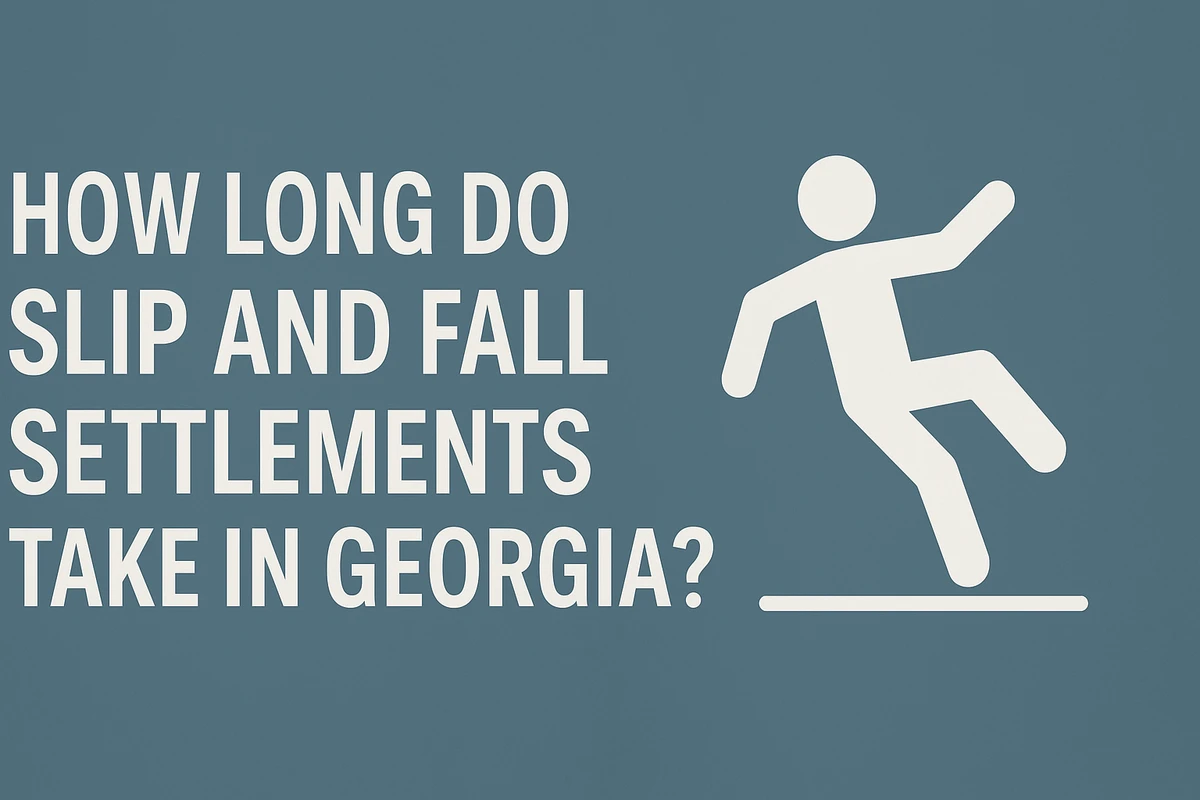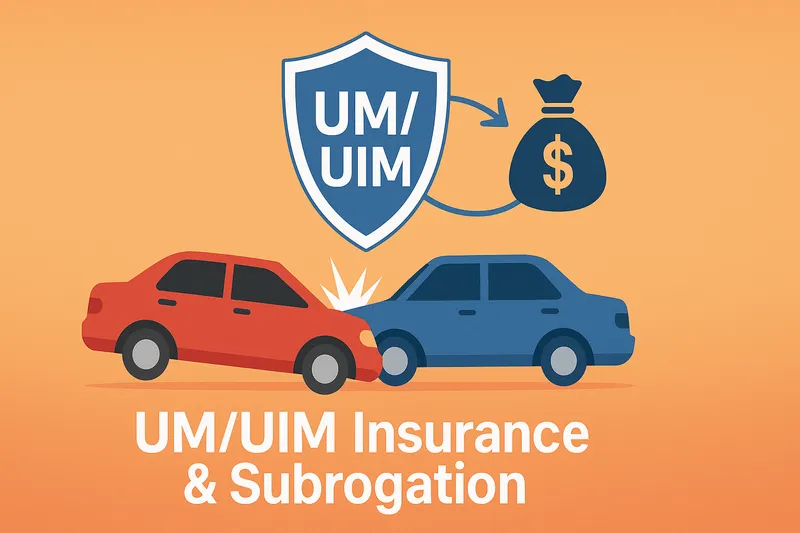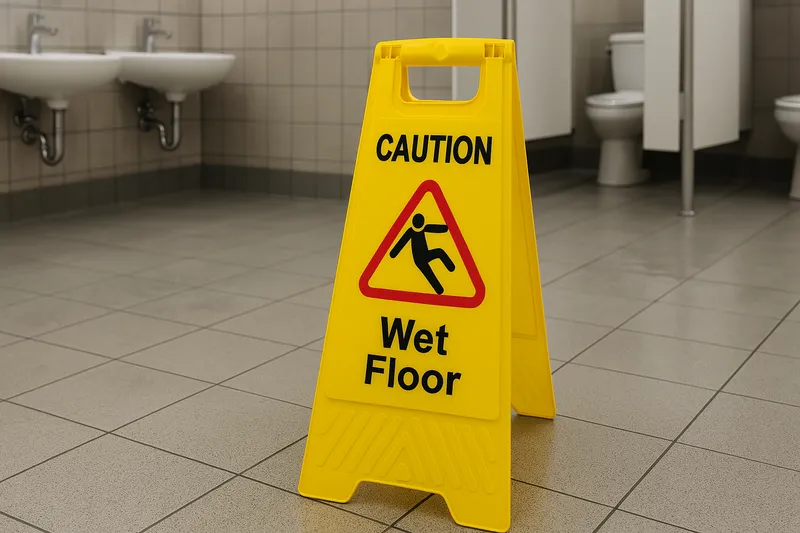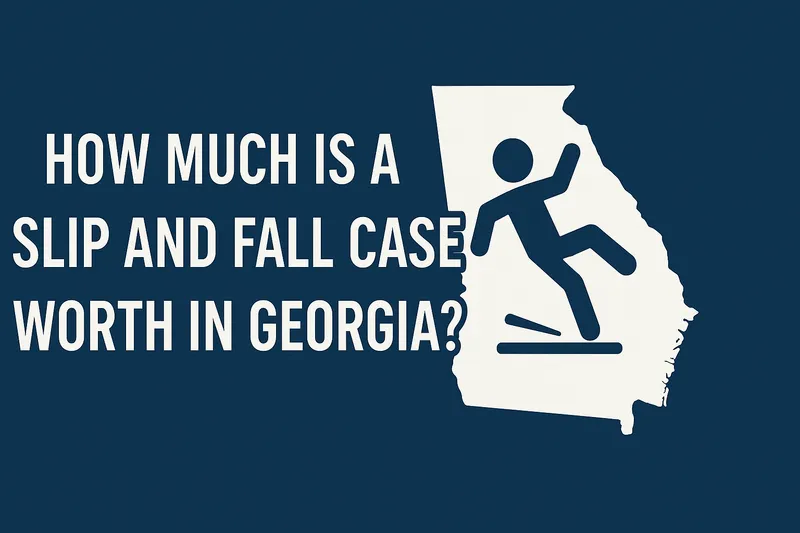How Long Do Slip and Fall Settlements Take in Georgia?

Published: 4/5/2025
The answer varies because every case is different. Factors like the severity of your injuries, the clarity of who was at fault, and the legal steps required all influence the timeline.
Typical Timeline of a Slip and Fall Case in Georgia
The process of a slip and fall claim can be broken down into stages. Below is a general timeline of what to expect in Georgia:
-
Immediate Aftermath and Treatment: After the accident, your first priority is medical care. You should reach maximum medical improvement (or close to it) before settling. You can’t get more money after a settlement, so it’s best so it’s best to wait until you have a clear picture of your injuries and treatment needs. This can take weeks or months, depending on the severity of your injuries. For example, if you suffered a broken leg, it might take 6-12 weeks to heal before you know if surgery or further treatment is needed.
-
Investigation and Evidence Gathering: Your attorney will investigate the accident, gather evidence, and determine fault. This includes securing incident reports, photographs, witness statements, and maybe surveillance video. Some evidence (like store CCTV footage or maintenance logs) might be held by the property owner and take time to obtain. There’s no set timeframe for this step – simple cases may be investigated in a few weeks, while complex cases (e.g. multiple witnesses or disputed conditions) could take longer.
-
Demand and Negotiation Phase: Once you have completed treatment (or have a clear picture of future medical needs) and the evidence is gathered, your lawyer will typically send a demand letter to the at-fault party’s insurance company, outlining your injuries and damages. Then, settlement negotiations begin. Often, the first insurance offer is low, and several rounds of negotiation may be needed. Each round can take weeks or months as both sides counteroffer and negotiate. If liability is clear and the insurer acts in good faith, a fair settlement might be reached in this phase without a lawsuit.
-
Filing a Lawsuit (if needed): If negotiations stall or the insurer denies a fair payout, the next step is to file a lawsuit. In Georgia, you typically have two years from the date of the slip and fall to file a personal injury lawsuit (this deadline is set by Georgia’s statute of limitations, O.C.G.A. § 9-3-33). In fact, Georgia law requires you to either settle your claim or file a lawsuit within two years of the accident – waiting longer likely means losing your rights. (Important: if your slip and fall was on government property, special ante litem notice rules apply – for example, you must formally notify a Georgia city of your claim within six months, or a county within one year, or you lose the right to sue. These shorter deadlines can accelerate how quickly you must act.)
-
Litigation and Discovery: Once a lawsuit is filed, the timeline extends as the case moves through Georgia’s courts. The defendant (property owner or insurer) has about 30 days to answer the complaint. Then both sides engage in discovery, exchanging documents and taking depositions (sworn statements). Discovery in a personal injury case can last several months or more depending on complexity. For a slip and fall, it’s common that liability is heavily disputed – the property owner may argue they weren’t negligent or even claim you were at fault. If fault is contested, it can add significant time. Unless liability is clear-cut, the other side will dispute fault and even try to blame the victim, which can delay your settlement considerably. During this phase, there may be motions and hearings in court, and often the court will order mediation or settlement conferences to encourage a resolution.
-
Settlement or Trial: A settlement can occur at any point during litigation. In fact, most personal injury cases settle out of court, even after a lawsuit is filed. As evidence is revealed in discovery, one side may become more willing to compromise. If a settlement is reached, the case concludes and the insurance will typically pay within a few weeks. A slip and fall case can settle at any point during litigation. Settlements occur after discovery, when both sides have a clearer picture of the evidence and damages. If no settlement, the case proceeds to trial. Going to trial adds more time – you must wait for a court date (which could be months out on a busy Georgia court docket) and then the trial itself (usually a few days or weeks of proceedings). If your case goes all the way to a jury trial, you should expect the process to take at least a year or more, and possibly longer if either side appeals the verdict. However, only a small percentage of slip and fall cases reach a verdict; many will settle before the trial concludes.
-
Post-Settlement Wrap Up: If you win at trial or obtain a settlement, there’s a brief wrap-up period. For settlements, lawyers will draft a release and the insurance company processes the payment. Georgia law firms often handle paying off any medical liens or bills from the settlement funds, which can take a few weeks. On average, it takes about six weeks from signing a settlement agreement to receive the check. If it was a trial verdict, there could be post-trial motions or appeals (adding months or more), but if not, payment is made according to the judgment.
Each of these stages contributes to the overall timeline. Depending on your case, you may not go through all the steps (for instance, you might settle before filing a lawsuit, skipping the litigation phase).
Factors That Influence How Long a Slip and Fall Settlement Takes
Several key factors will affect whether your case is resolved quickly or stretches out longer:
-
Severity of Injuries and Treatment: The more serious your injuries, the longer your medical recovery may take – and you generally should not settle until treatment is complete or you have a clear prognosis. For example, if you suffered broken bones or a head injury, it might take many months to heal or reach maximum improvement. As one Georgia attorney notes, “It may take weeks or months of recovery and rehabilitation until you know if you will fully recover.” Only once your doctors determine the full extent of your injuries (and any future care needs) can your attorney accurately value your case. Severe injuries (or complications requiring surgeries, physical therapy, etc.) tend to lengthen the timeline because they necessitate a longer monitoring period before settlement.
-
Disputed Liability: If it’s clear that the property owner was negligent (for instance, there is unquestionable evidence of a hazard and no warning), a case will likely settle faster. However, in many slip and fall claims, liability is hotly contested. The insurance company may argue the hazard was not their fault or claim you were careless (for example, by not paying attention or wearing improper footwear). Georgia follows a comparative negligence rule, meaning your compensation can be reduced if you were partly at fault, and if you’re 50% or more at fault you recover nothing. Because of this, defendants have an incentive to push some blame on you to avoid or reduce payment. All these arguments can slow down negotiations. In short, when fault is murky, settlements take longer – the case might need extensive evidence and even a court determination of fault. As noted earlier, an at-fault party who believes they have a strong defense may drag the case out (and even risk a trial) rather than pay quickly.
-
Evidence Gathering: Related to liability, the availability and strength of evidence can speed up or delay your claim. If crucial evidence (like a store’s surveillance video of your fall or maintenance records proving negligence) is easy to obtain and clearly supports your case, the insurer is more likely to offer a fair settlement earlier. On the other hand, if evidence is missing, difficult to get, or unclear, it may take extra legwork (and time) to build your case. Sometimes lawyers must hire experts (such as engineers or safety experts) to prove a dangerous condition existed for a long time or that a property violated safety codes. This investigative process can add weeks or months. Your prompt action after the accident – reporting the incident, preserving photos, and consulting a lawyer – can help ensure evidence is gathered before it’s lost or destroyed, ultimately helping prevent unnecessary delays.
-
Insurance Company Cooperation: The attitude and policies of the insurance company involved can influence timeline. Some insurers are willing to settle straightforward claims quickly, while others may delay or low-ball offers as a tactic. It’s not uncommon for the first offer to be far below what you deserve. Negotiating a fair amount can require patience. Multiple rounds of offers and counter-offers might be exchanged; as one legal source notes, this process can take “weeks or months” in itself. Additionally, if the claim is of high value, the insurer might investigate extensively or wait until the threat of trial is imminent before making a reasonable offer.
-
Whether a Lawsuit Is Filed: As described in the timeline, filing a lawsuit generally means a longer road to resolution. If your case settles pre-suit, it could conclude within months. If it goes into the court system, the case timeline shifts into the court’s schedule – which includes waiting for court dates, complying with legal procedures, and possibly dealing with backlogs. Georgia courts (including those in Forsyth County, where Cumming is located) handle many cases, and a civil case like a slip and fall might not go to trial until a year or two after filing. The necessity of a lawsuit often depends on those earlier factors: clear-cut cases settle faster, whereas cases with disputes or high stakes often require filing suit and thus take longer.
-
Involvement of a Government Entity: If your slip and fall accident happened on public property (like a fall on a sidewalk maintained by the City of Cumming or a slip in a county-owned building), special legal steps are required that can affect timing. Georgia law mandates an ante litem notice – essentially a formal notice of your claim to the government – within six months for city claims or one year for county or state claims. This means your attorney must act quickly to notify the government. While this doesn’t necessarily speed up the settlement (government claims can actually take a while to negotiate), it does set an earlier deadline to initiate the process. Failing to meet the notice deadline can bar your claim entirely, so your lawyer will prioritize this. Once the notice is sent, the government entity has an opportunity to respond or settle the claim before a lawsuit is filed. Some municipalities may investigate and possibly settle valid claims sooner to avoid litigation, but others may deny liability, requiring a lawsuit. Overall, if a government entity is involved, expect some additional procedural steps early on, but the later timeline (if you sue) will be similar to any other lawsuit.
-
Court Schedules and Legal Procedures: Every lawsuit must follow Georgia’s civil procedure rules. There can be unavoidable waiting periods built into the system (for example, 30 days for the defendant to answer the complaint, or a standard 6-month discovery period). Additionally, court calendars can influence timing – in a busy jurisdiction, you might wait longer for a trial date. In Cumming (Forsyth County), the courts generally move efficiently, but any case can face delays if dockets are crowded or if continuances are requested. Mediation or arbitration might be recommended or required by some courts before trial, which could either help settle the case faster or add another step to go through. Your attorney’s familiarity with the local court procedures can help in navigating these aspects smoothly.
These factors intertwine in each case. For instance, you might have severe injuries (which slows things down) but very clear liability (which helps speed up settlement). An experienced lawyer will assess all these elements to estimate your case’s likely timeline and will take steps to mitigate delays wherever possible.
How Long Do Slip and Fall Settlements Usually Take in Georgia?
Because every case is unique, there is no universal answer. However, looking at typical outcomes in Georgia can give you a rough idea:
Straightforward Cases
If liability is obvious (e.g. you slipped on a clearly neglected hazard and there’s little doubt the owner was at fault) and your injuries, while significant, are not catastrophic, a settlement could be reached relatively quickly. In Georgia, when facts aren’t disputed and damages are well documented, a case might settle in just several weeks to a few months. With clear fault and proper evidence, the timeline to settle can be short because there’s little to argue over. Slip and fall claims involving clear negligence and moderate injuries often settle within 9–12 months after medical treatment is complete. This would typically be the scenario where negotiations go smoothly and no lawsuit is needed. Many smaller slip and fall claims in Georgia (for example, cases with minor to moderate injuries) indeed resolve in under a year.
Complex or Disputed Cases
If there are complications – serious injuries, significant disputes over fault, or other challenges – the timeline lengthens. It’s not unusual for a contentious slip and fall case in Georgia to take over a year. For example, if a lawsuit is filed because a settlement couldn’t be reached early, it can take roughly 18 months to three years from the time the lawsuit is filed to finally resolve a slip and fall case. This accounts for the discovery process, court scheduling, and possibly a trial. So a tougher case might resolve somewhere in the 1.5 to 3 year range after suit is filed – and remember, filing itself might happen a year or so after the accident if one tried negotiations first. In total, those cases can span multiple years from the date of injury. While that sounds daunting, those are typically the outliers involving extensive litigation. The majority will not take that long, but multi-year timelines can happen in Georgia, especially if the case goes to trial or appeal.
However, every case is different. Sometimes just filing the lawsuit can prompt the other side to take negotiations seriously, and a settlement can be reached weeks after the lawsuit is filed. Other times, even straightforward cases can face delays due to court schedules or insurance company tactics. The key is to have an attorney who understands the process and can help you navigate it effectively.
Here’s how our slip and fall lawyers in Cumming, GA help manage and speed up the settlement process:
From day one, we act quickly. Our team will immediately investigate your accident, secure evidence (photos, video, witness accounts), and document your injuries. By building a strong case early, we put pressure on the at-fault party and their insurer to take your claim seriously. We also make sure to meet all Georgia deadlines well before they expire – including the 2-year lawsuit filing limit and any 6-month or 1-year ante litem notices for government claims. Meeting these deadlines protects your case and avoids needless delays or legal hiccups that could slow things down.
One reason settlements get delayed is disagreements over the value of the claim. We prevent this by working closely with you and your doctors to compile complete medical records, bills, and evidence of other losses (like lost income or pain and suffering). We often consult with medical experts to project any future treatment needs or with financial experts to calculate long-term impacts. By having a well-documented file, we can confidently demand the maximum compensation you deserve. This thorough preparation often convinces insurance companies to offer a fair settlement sooner, because they see we can prove our case value in court if needed.
Our attorneys are skilled negotiators who have dealt with numerous insurance companies in Georgia. We know their tactics and how to counter them. When an insurer drags its feet or offers too little, we push back effectively. We keep the lines of communication open and maintain a sense of urgency. If an insurer knows you have strong legal representation that is ready to go to trial, they are more likely to stop stalling and engage in serious settlement talks. We can also advise you on when a settlement offer is fair and when it’s best to hold out or escalate the claim. Our goal is to avoid unnecessary delays but never to settle for less than you deserve. We aim to strike that balance – moving quickly, but not rushing into a bad deal. While we cannot always control how long the process takes, we can control how hard we fight for you and how effectively we advocate for your rights.
Being based in Cumming, our firm knows the local court system and community. We’re familiar with Forsyth County court procedures and the tendencies of local insurers and defense firms. This local insight allows us to anticipate potential slowdowns and gives us familiarity with local businesses and properites where these accidents commonly occur.
While we strive to settle claims efficiently, we won’t hesitate to file a lawsuit and aggressively litigate if that’s what it takes. Some law firms might delay filing suit hoping a case will settle eventually – at Bourne Law Firm, we recognize when negotiation is at a standstill. If the two-year deadline is approaching or the insurer isn’t negotiating in good faith, we will take action by filing your case in court to protect your rights. Often, taking that formal step can motivate the other side to get serious. And if the case proceeds through litigation, our trial experience means we can navigate the process as swiftly as possible. We prepare thoroughly so there are no unnecessary postponements, and we advocate strongly to potentially reach a settlement before trial (during depositions or mediation) if it’s in your best interest. However, if a trial is needed, you can count on our dedication to see it through and fight for you. Knowing that you have trial-ready lawyers gives you leverage – the defendant knows we won’t simply give up if they stall.
Lastly, we understand that waiting for a settlement can be difficult for clients who have mounting medical bills or cannot work due to injuries. Our team not only fights legal battles but also assists clients in practical ways during the process. We can help negotiate medical bill payment plans or liens with healthcare providers to buy you time. We promptly return your calls and answer your questions, so you’re never in the dark. By reducing your stress and handling the complex stuff, we let you focus on healing. A calmer, well-informed client can make better decisions, which ultimately helps the case move along smoothly toward resolution.
If you or a loved one has been injured in a slip and fall in Cumming or anywhere in Georgia, don’t hesitate to reach out for a free consultation. We’ll evaluate the details, give you an honest outlook on the timeline and your options, and immediately begin working on a plan to pursue your claim. Time is of the essence, but with the right approach and a dedicated attorney, you can secure a fair settlement in a timeframe that makes sense for your situation. At Bourne Law Firm, we are committed to handling your case with urgency, care, and determination – so you can focus on healing, while we focus on getting you justice.
Related Articles





